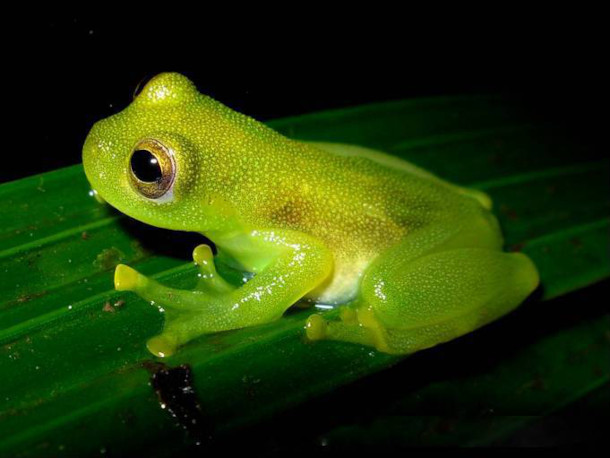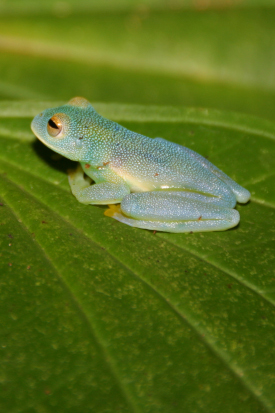Note on Emerging Science: Glass Frogs
Air Date: Week of July 28, 2023

A glass frog (Rulyrana susatamai) sits on a leaf. (Photo: Mauricio Rivera Correa, Wikimedia Commons, CC BY-SA 2.5)
So-called glass frogs have translucent skin, which shows their internal organs. Living on Earth’s Don Lyman reports that these frogs have a special kind of blood that helps them camouflage when sleeping.
Transcript
LYMAN: Glass frogs are a tropical species whose name derives from their translucent skin, which is clear enough to see through to their internal organs and their blood circulating. And scientists have recently discovered that when the tiny frogs sleep in the rainforest at night, 90 percent of their red blood cells disappear into their liver, which hides the cells behind a mirror-like surface. That makes them more camouflaged and harder to spot for hungry predators, like snakes.
Scientists were surprised to find out that, despite the red blood cells being crammed into tiny pockets in the liver for hours, no blood clots formed. When the sleeping frogs awaken, their blood cells unpack themselves from the pockets in the liver and begin circulating again.

Another glass frog, Cochranella granulosa, found in Manuel Antonio National Park in Costa Rica. (Photo: JurriaanH, Wikimedia Commons, CC BY-SA 3.0)
The scientists were able to observe the hidden blood cells by using a technique called photoacoustic imaging, which showed the interior of the frogs’ livers by using subtle vibrations created by light striking various molecules and causing slight energy releases.
Some vertebrates are even more transparent than glass frogs. Larval stages of some fish, such as tarpon, eels, glassfishes, and Asian glass catfish, are almost perfectly transparent.
But having a transparent body on land or sea can have clear advantages.
That’s this week’s note on emerging science. I’m Don Lyman.
Links
Living on Earth wants to hear from you!
Living on Earth
62 Calef Highway, Suite 212
Lee, NH 03861
Telephone: 617-287-4121
E-mail: comments@loe.org
Newsletter [Click here]
Donate to Living on Earth!
Living on Earth is an independent media program and relies entirely on contributions from listeners and institutions supporting public service. Please donate now to preserve an independent environmental voice.
NewsletterLiving on Earth offers a weekly delivery of the show's rundown to your mailbox. Sign up for our newsletter today!
 Sailors For The Sea: Be the change you want to sea.
Sailors For The Sea: Be the change you want to sea.
 The Grantham Foundation for the Protection of the Environment: Committed to protecting and improving the health of the global environment.
The Grantham Foundation for the Protection of the Environment: Committed to protecting and improving the health of the global environment.
 Contribute to Living on Earth and receive, as our gift to you, an archival print of one of Mark Seth Lender's extraordinary wildlife photographs. Follow the link to see Mark's current collection of photographs.
Contribute to Living on Earth and receive, as our gift to you, an archival print of one of Mark Seth Lender's extraordinary wildlife photographs. Follow the link to see Mark's current collection of photographs.
 Buy a signed copy of Mark Seth Lender's book Smeagull the Seagull & support Living on Earth
Buy a signed copy of Mark Seth Lender's book Smeagull the Seagull & support Living on Earth

